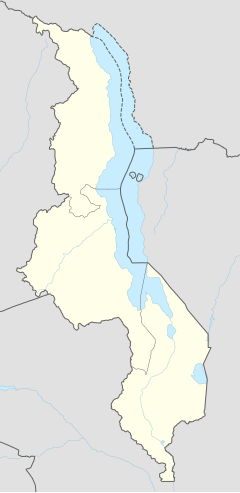The Continuing Anglican movement, also known as the Anglican Continuum, encompasses a number of Christian churches, principally based in North America, that have an Anglican identity and tradition but are not part of the Anglican Communion.
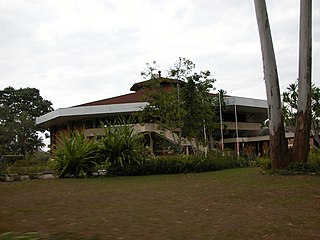
Zomba is a city in southern Malawi, in the Shire Highlands. It is the former capital city of Malawi.
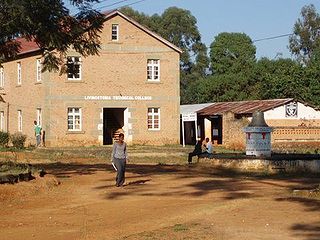
Livingstonia or Kondowe is a town located in the Northern Region district of Rumphi in Malawi. It is 430 kilometres north of the capital, Lilongwe, and connected by road to Chitimba on the shore of Lake Malawi.
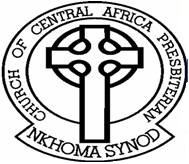
The Church of Central Africa Presbyterian – Nkhoma Synod was founded in 1889 and is one of the major Protestant churches in Malawi. The Church consists of 124 congregations and 1,298 prayer houses and serves 800,000 members. The churches meet every two years in a synod. They have adopted the Belgic Confession, Heidelberg Catechism and Canons of Dort as their doctrinal standards. Along with the General Synod of the CCAP, the Nkhoma Synod is a member of the World Communion of Reformed Churches.
Mizoram Presbyterian ChurchSynod is the largest Christian denomination in Mizoram, northeast India. It was a direct progeny of the Calvinistic Methodist Church in Wales. It was the first church in Mizoram and is now one of the constituent bodies of a larger denomination Presbyterian Church of India (PCI), which has its headquarters in Shillong, Meghalaya. The administrative body called the Mizoram Synod has its headquarters at Mission Veng, Aizawl. As the first church, it remains the largest denomination in Mizoram.
The CSI Tiruchirappalli Thanjavur Diocese is a diocese of Church of South India in Tamil Nadu state of India. The diocese is one among the 24 dioceses of Church of South India and was one of the first 14 dioceses to be formed at the inaugural of the Church of South India in 1947.
The Presbyterian Church of Nigeria is a Presbyterian church in the Nigeria and subscribes to the Westminster Confession of Faith.
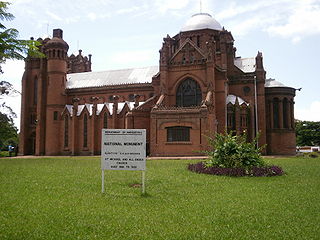
The Church of Central Africa Presbyterian (CCAP) is a Presbyterian denomination. It consists of five synods: one in Zambia, one in Zimbabwe and three in Malawi – Livingstonia Synod in the north of the country, Nkhoma Synod in the centre, and Blantyre Synod in the south.

Synod Hospital, Durtlang is a general hospital and nursing school in Aizawl, Mizoram, India. The hospital is widely known among Mizo people as "Durtlang Hospital". It is managed and governed by the Mizoram Presbyterian Church Synod. The hospital was established in 1928 by the Calvinistic Methodist Church as a nursing institute. It is the second hospital established, and the largest non-governmental hospital in Mizoram. It has a registered capacity of 355 beds.

The Synod of Zambia is one of the five synods of the Church of Central Africa Presbyterian.
The Reformed Church of Mozambique (Mphatso Synod) was founded in the 1970s by Reverend Nehemia Katundu and Reverend Botha. They were missionaries that were sent to Mozambique by Nkhoma Synod to set up a Reformed Church. There are now 3 Synods, 4 Presbyteries in Tete, and 4 in Zambesia and 70,000 members. Official languages are Portuguese, Lomwe and Chichewa. The Synod affirms the Apostles Creed, Belgic Confession, the Heidelberg Catechism and the Canons of Dort. The Christian Reformed Church in North America supports the Synod.
The Reformed Church in Zimbabwe was founded by Dutch Reformed Church in South Africa missionaries on the 9th of September 1891. Andrew A. Louw begun to preach in the area near Morgenster among Shona people. The worship language of churches was Afrikaans and English. Later the denomination expanded among Nyanja people. In 1999 a new mission field was opened in Binga District. The young Church was administered from South Africa under the Dutch Reformed Church Cape Synod, eventually, the African Reformed Church in Rhodesia came into being, as an indigenous and independent church, under the control of church councils, four presbyteries and a synod. In 1977 it became the fully autonomous African Reformed Church. Soon after the country's independence in 1980, the name was changed to Reformed Church in Zimbabwe. Some historic church structures are still referred to as Dutch Reformed Churches and some Reformed Church members still use that name. The R.C.Z subscribes to the Heidelberg Catechism, Belgic Confession, and the Canons of Dort as its doctrinal standard. The R.C.Z is a member of the World Council of Churches, the Zimbabwe Council of Churches. In addition to its various church activities, the church has a special concern for its schools namely Henry Murray School for the deaf in Morgenster, and the Margaretha Hugo School (Copota) for the blind in Zimuto. The RCZ is also the responsible authority for a number of primary and secondary schools, a teacher-training college, Murray Theological College and the Reformed Church University (RCU) in Masvingo, as well as two hospitals and several clinics.

Gregg Alan Mast was a Reformed clergyman, scholar, and seminary president. Mast was the author of six books on Christian practice and theology, and the editor of a collection of sermons by Reformed minister and theologian Howard G. Hageman

Malosa is a small trading centre located in the Zomba District of Malawi. The Malosa mountain range and plateau neighbours the more famous Zomba Plateau and is separated by the Domasi Valley. Malosa is on the M3, 27 km from the city of Zomba. The earth road from the trading post leads from the edge of the main road right up to the base of the Malosa mountain range.

The Church of Central Africa Presbyterian – Blantyre Synod is a synod of the Church of Central Africa Presbyterian, located in southern Malawi. It was founded by Church of Scotland missionaries in 1876.
Daniel Rathnakara Sadananda is a New Testament Scholar who is re-elected as the General Secretary (Triennium 2017-2020) of the Church of South India Synod headquartered in Chennai as well as the Chairperson (triennium 2015-2018) of the Council of the United Theological College, Bangalore, the only autonomous College under the Senate of Serampore College (University). He also serves as the Vice President of National Council of Churches in India (2016-2020) as well Executive Secretary of the Communion of Churches in India comprising CNI, CSI, Marthoma Churches and now MCI.
The Kosin Presbyterian Church in Korea, also called Korea-pa, is an Evangelical Reformed and Presbyterian denomination in the Republic of South Korea. Although, congregations have spread all over North America and in many other countries.

